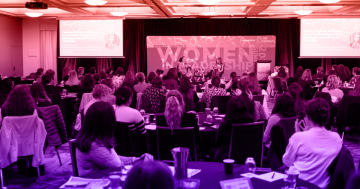Michele Weldon* says a new study shows that the stress of trying to be perfect at work harms women of all ages.
 All of us — we can assume — want to be good at what we do.
All of us — we can assume — want to be good at what we do.
Even in the most trying of times, as we are in now.
Many of us understand fully the need for validation, applause and recognition in the workplace.
A nod from the manager, an email from the boss.
It matters.
A new study on perfectionism shows that many women are holding themselves to standards of perfection that are not achievable, setting themselves up not just for disappointment, but also for disaster.
“Even though most women know deep down that perfection is unattainable, they still strive for it,” explains Dr Ilona Jerabek, President of PsychTests, which created and administered the study.
“It’s that duality that causes so much heartache; that constant battle between the woman they want to be, and the woman they feel they need to be,” Jerabek says.
“For example, the vast majority of the women in our study said that they are proud of their achievements.”
“Yet, more than half of them still worry about what other people think of them.”
Jessica Bennet wrote recently in The New York Times that “the term ‘impostor syndrome’ wasn’t coined until 1978 … but it’s safe to assume that women have always felt it.”
“It’s that nagging feeling that you’re not good enough, that you don’t belong, that you don’t deserve the job, the promotion, the book deal, the seat at the table.”
In her new research, Jerabek found that 67 per cent of Gen Z women are only satisfied when a task is done perfectly, while 71 per cent of Gen Y feel that way.
Sixty-four per cent of Baby Boomers require perfection every time, while 65 per cent of Gen X female workers feel that way.
For a recent episode of her Power To You podcast, Gloria Feldt, co-founder and President of Take The Lead, tackled the topic in, “How To Shuck Imposter Syndrome”.
Feldt advises: “Change your mindset, change your perspective of yourself.”
In the PsychTests study, Jerabek says that 71 per cent of women Gen Y workers say they want to excel at everything they take on, while 66 per cent of Gen Z female workers said the same.
Fifty-six per cent of Baby Boomers agreed with that statement, while 54 per cent of Gen X women at work said the same.
“On the one hand, I believe we have come very far in terms of shattering beauty and gender role stereotypes, and making women feel more comfortable with who they are,” Jerabek says.
“On the other hand, so many women are still ridden by self-doubt and a need for external validation, still struggle with self-esteem issues and imposter syndrome, and still feel that self-love is selfish and egotistical.”
The study shows women of all ages set very high standards for themselves.
That is a good thing, but they also say they are only satisfied if the work receives high praise from a manager, teacher or boss.
A fear of criticism is also at play.
Generalising that a single failure in a task or assignment makes someone a failure as a person is also common.
About half of the time — all women in all generations in the workplace — report they constantly worry about making mistakes.
The study also shows that the pressure to be perfect is real, from family and friends as well as society.
The thought of being considered “average” by society terrifies women in all age groups.
“Because this concept of the ‘ideal woman’ still floats around on social media, on television, and in movies — and it’s a moving target,” Jerabek says.
“So, it’s a constant, every day pressure women put on themselves to be everything to everyone.”
“However, while it is true that women are bombarded with the unrealistic messages about the ideal female, we are as guilty, if not more, of imposing impossible standards on ourselves.”
“We are not helpless victims.”
“We have a voice.”
“We can step into our power without blaming our lack of self-love on society.”
“We can take responsibility for our own happiness — and taming our perfectionism is a great step in the right direction,” Jerabek says.
Feldt, author of No Excuses, who recently launched a new set of 9 Leadership Power Tools, says: “From my research, interviewing women … and looking into my own heart and career, I concluded that the most important thing for a woman to learn is how to redefine power in order to embrace it authentically.”
“When she knows the power in her own hands, she can go forward to lead with intention, confidence, and joy.”
“Women are often ambivalent about power because we have borne the brunt of its negative aspects for millennia.”
“Power has been defined as the power over something or someone.”
“Once we redefine power as the power to — the positive power to accomplish good things in this world, power to thrive as an individual, and the power to make life better for ourselves, our families, our organisations, the world — we can embrace it fully.”
“Power over is oppressive. Power to is leadership.”
As this study confirms, for many women, the notion of perfection is haunting.
The notion of power is liberating.
* Michele Weldon is Editorial Director of Take The Lead. She tweets at @micheleweldon. Her website is www.micheleweldon.com.
This article first appeared at www.taketheleadwomen.com.











